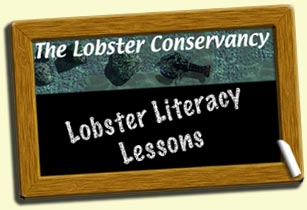
Lobster Literacy
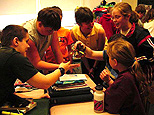 Photo by Carla Eutsler
Photo by Carla Eutsler
Over the years, TLC scientists and volunteers have participated in
an informal education program by giving presentations at public forums
and schools. To formalize our education program in 2002 we launched
a Lobster Literacy Program. The overall goal of the program is to increase
students' environmental literacy, particularly with regard to lobsters
and the marine environment. Our program has several components including
classroom projects, an education center, and presentations to schools
and other groups.
Lobster Larvae in the Classroom
TLC's first Lobster Larvae in the Classroom program was a
resounding success. In May of 2002, TLC Educators Dan O'Grady
and Linda Archambault helped students in Carla Eutsler's 5th
and 6th grade science classes at Friendship Village School raise
lobsters from hatching to settlement. In the process students
learned about lobster biology and the marine environment. They
participated directly in the aquaculture of lobsters by monitoring
the water quality in the lobster raising tanks, raising brine
shrimp to feed the lobster larvae, and identifying the larval
stages as they grew. These budding scientists had plenty of opportunities
to hone their observation skills by watching and writing about
the recently settled lobsters in the aquarium.
Dan and Linda directed activities on microscope theory and use, marine
food webs, nutrient cycling in the ocean, and reproductive strategies
of marine organisms.
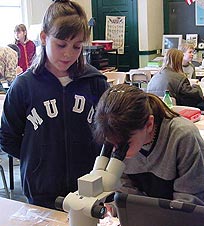
TLC's education program, "Lobster Larvae
in the Classroom," gave students at the Friendship
Village School great opportunities to develop their observational
and scientific skills (photo by Carla Eustler).
They also led a field trip to the intertidal zone. In a program presented
by Sarah Gladu and Emily Kuhnlein of the University of Maine Cooperative
Extension, students learned about the important role of phytoplankton
in the marine ecosystem. A visit from TLC scientist Diane Cowan introduced
the students to lobster reproductive biology. Teacher Carla Eutsler
developed art and writing projects that reinforced students’ learning
about lobsters and the marine environment.
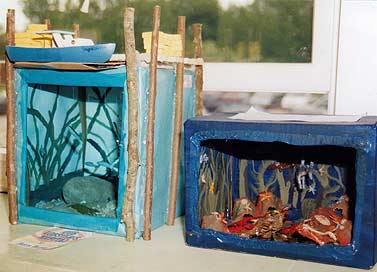
Students created panoramas illustrating
what they had learned about lobsters and the marine environment.
(Photo by Sara Ellis).
Parents and community members had a chance to view the products of
the project at an Open House on June 10, 2002. The recently settled
little lobsters will ultimately be moved to TLC’s Lobster Life
Studies Center then tagged and released. They are currently being maintained
at TLC’s Lobster House.
The collaboration between TLC scientists and FVS teacher Carla Eutsler was
very rewarding for all involved. Carla plans to repeat the project in 2003
with her 5th graders. We look forward to working with her again. In 2003, the
project will also be brought to students at Vinalhaven School and at the King
Middle School in Portland. Many thanks to MBNA for funding this wonderful project.
Thanks also to Brian Tarbox of Southern Maine Technical College for providing
the first round of larval lobsters and for technical expertise on rearing lobsters.
Check out some newspaper articles about the Lobster Larvae in the Classroom
project on TLC’s press page.
Developing a Lobster Curriculum
TLC has recently received funding to enlist interested teachers
from coastal Maine to work with us in developing a multi-disciplinary
Lobster Literacy Curriculum for Maine students. We plan to hold
a teacher retreat April 12 and 13, 2003. At the retreat, TLC
scientists will present the essential lobster science information
and demonstrate the Lobster Larvae in the Classroom project.
TLC scientists will then work with teachers to outline curriculum
materials. Participants will be assigned to develop parts of
the curriculum in the months after the retreat. The products
of this collaboration will be a teacher’s guide, student
workbook, and classroom project kit that meet the state’s
Learning Results guidelines. We plan to distribute the curriculum
materials through the Internet and continue to work directly
with teachers and students participating in the Lobster Larvae
in the Classroom project. By making a lobster literacy curriculum
available to Maine students we wish to foster an increased knowledge
about the fundamentals of lobster biology, encourage an increased
appreciation for the lobster’s role in the history, culture,
and economy of the Gulf of Maine, and inspire a sense of stewardship
of our natural resources. Stay tuned for further developments
from this exciting collaborative project. Check out out list
of resources.
Lobster Learning Center
Thanks to Island Institute fellow Dan O'Grady and a grant
from MBNA our property at Little Morse Island is being transformed
into the Lobster Learning Center. This facility will include
indoor and outdoor classrooms where teachers, school children
and community groups can become involved in hands-on education
and research. This past summer, Dan oversaw many improvements
to the building and grounds. Eventually we plan to have an Education
Coordinator living at the pound from May through September to
host school and community groups and give them a first-hand look
at TLC's research and teach them about the lobster life cycle
and the marine environment.
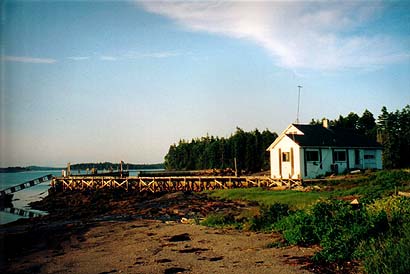
The classroom building and wharf at Little
Morse Island (photo by Dan O'Grady).
We used the facility twice for education purposes in 2002. In August,
students from Hurricane Island Outward Bound School traveled to Little
Morse Island in two pulling boats. As part of a service-learning project
they cleaned up the periphery of the pound in return for lessons on
lobster biology and research.

Hurricane Island Outward Bound students
help with clean-up at the Lobster Learning Center (photo
by Linda Archambault).
Later that month Dan O’Grady and Linda Archambault wowed a group
of children visiting from Warren School Age Child Care with a presentation
on the lobster life cycle.
For information about any of TLC’s education programs, please
contact education coordinator, Linda
Archambault.
|

